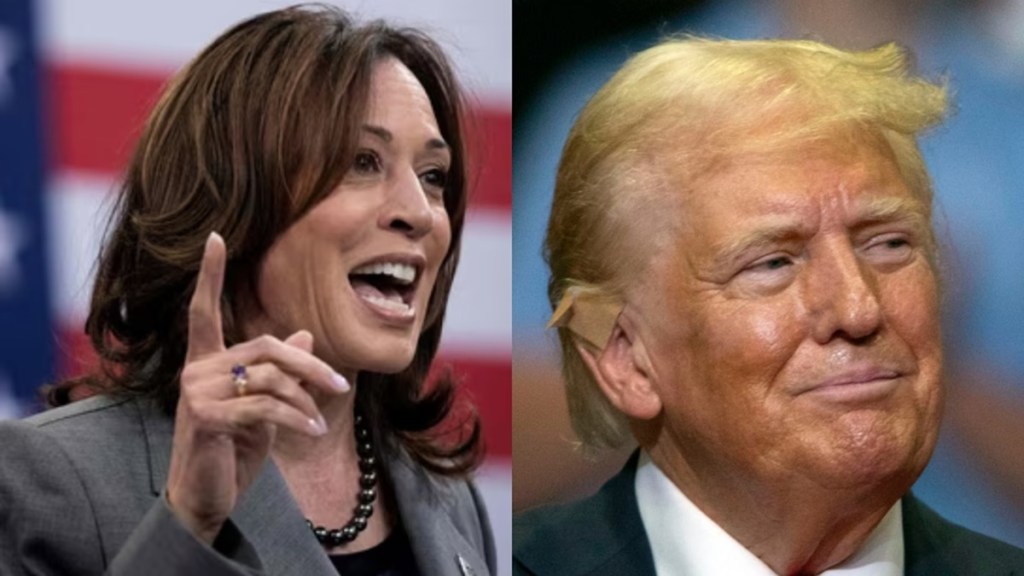By Atanu Biswas
Every election is distinct and noteworthy. The US presidential elections are no exception. But the 2024 election will be unique. In fact, Kamala Harris is the first woman of colour, second person of colour (after Barack Obama), and second woman (after Hillary Clinton) to be a major party nominee for President. Clearly, more significant history will be made if Harris prevails in the election.
However, there are numerous more unique characteristics of the 2024 race. The manner in which Harris replaced President Joe Biden as the Democratic Party’s nominee is a story worthy of a political thriller. Biden was increasingly trailing Republican nominee Donald Trump in the race between the two elderly men. Then came the historic June 27 Trump-Biden presidential debate in Atlanta, in which Biden had an abject performance that turned the race upside down and ultimately led to his decision to withdraw from consideration for re-election. A few minutes into the debate, in fact, there was a deep, wide, and extremely aggressive panic in the Democratic Party, and some within the party started demanding for President Biden to withdraw from the presidential campaign right then.
Though incredibly unexpected, Biden’s withdrawal was a landmark moment in US history. As many experts claim, the consequences of presidential debates are generally negligible. Whatever the case, there has never been a presidential debate in American history that has been as significant as this one, perhaps.
But one would wonder how Biden, arguably one of the most seasoned politicians alive, could perform so poorly in a prescheduled presidential debate. Whatever the situation, the Trump-Biden debate effectively shifted the balance of power in the Democrats’ favour — something that might not have been as simple, perhaps, if Harris had been chosen as the Democratic nominee at the outset.
Interestingly, Harris was up for the Democratic candidacy in the 2020 election. But even before the primaries, on December 3, 2019, she pulled out of the contest. A few candidates competed in the brief Democratic primaries in 2024, but Harris was not among them. Therefore, one can question what Harris’ chances of winning the Democratic nomination would have been in the event of a full-fledged primary, as there was in 2020. And what would have been the outcome of the opinion polls on her chances if she had won a regular Democratic primary?
This year, however, is unique in that nearly every delegate chosen to support Biden in the primaries is now supporting Harris, even though she was not included on any primary ballot. It’s possible that Harris was also fortunate in that she didn’t have to undergo a party nomination to succeed Biden, as other contenders swiftly jumped at the chance to support her before the Democratic National Convention. That elevated Harris to the status of a formidable contender who might win the race in the end. Perhaps this would not have been the case if Biden’s extremely dramatic exit had not occurred during the nomination process.
And then there is Trump, who can never be written off despite having been impeached twice and being found guilty of 34 felonies. Currently, he is facing multiple legal cases and is being accused of lying on numerous occasions. But even after losing the 2020 election, he retained firm control over the Republican Party. It should be remembered that he enjoys the support of almost half of the US, regardless of the results of the November 5 election.
In fact, as many believe, Trump may benefit if the election is taken to court. Currently, six of the nine justices on the US Supreme Court were chosen by Republican presidents. Furthermore, it’s widely discussed in American society how loyal judges are to the president and the party that appointed them.
Politically speaking, it’s still a close race overall. Numerous polls show that the difference between support for Trump and Harris is largely within the customary 3% margin of error. Also, in the US electoral college system, where a state is won as a whole, it makes little difference if one leads by one or two percentage points nationally. Ask Hillary Clinton; she would vouch for it. As everyone knows, the US presidential elections are truly won or lost by a small number of swing states, or battlegrounds, where the candidates are separated by as little as one or two percentage points. In 2024, Pennsylvania, Nevada, North Carolina, Georgia, Arizona, Michigan, and Wisconsin are such swing states.
Again, opinion polls frequently yield inaccurate evaluations of the outcome. Polls grossly misrepresented the popular vote at any point in the election year in 1948, 1980, 1992, and 2012. Moreover, polls underestimated Trump’s support in both the 2016 and 2020 elections. Additionally, the error margin of 3% is stated, assuming that the sample consists of red and blue balls selected from an infinite population. However, humans don’t behave, in any event, like balls. The majority of individuals never answer surveys. Additionally, respondents may lie to pollsters or alter their preferences. And pollsters must make educated guesses about the likely voters in their sample.
During his final hours as president in January 2021, Trump told his supporters, “So just a goodbye. We love you. We will be back in some form”, perhaps in the vein of the Frank Sinatra classic “My Way”. Can he pull off one of the most spectacular political comebacks in history, or will Harris create history? The contest is still open to anyone.
The author is the professor of statistics, Indian Statistical Institute, Kolkata.
Disclaimer: Views expressed are personal and do not reflect the official position or policy of FinancialExpress.com. Reproducing this content without permission is prohibited.


